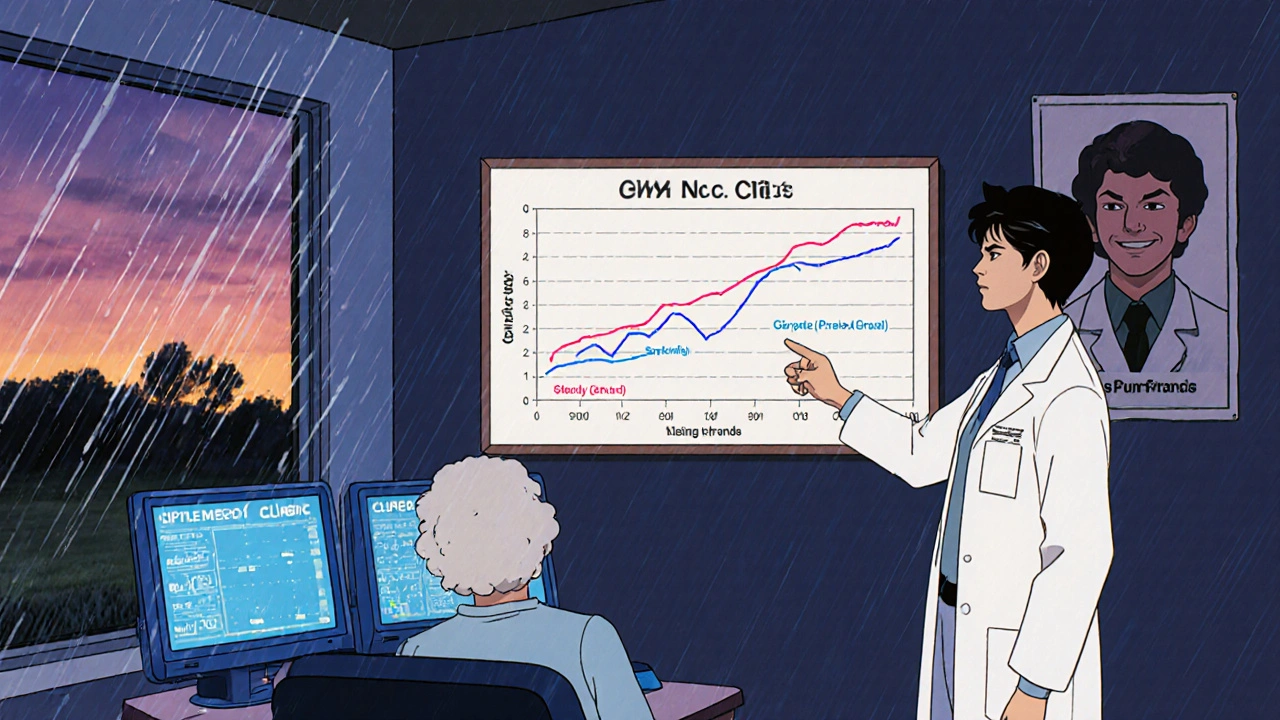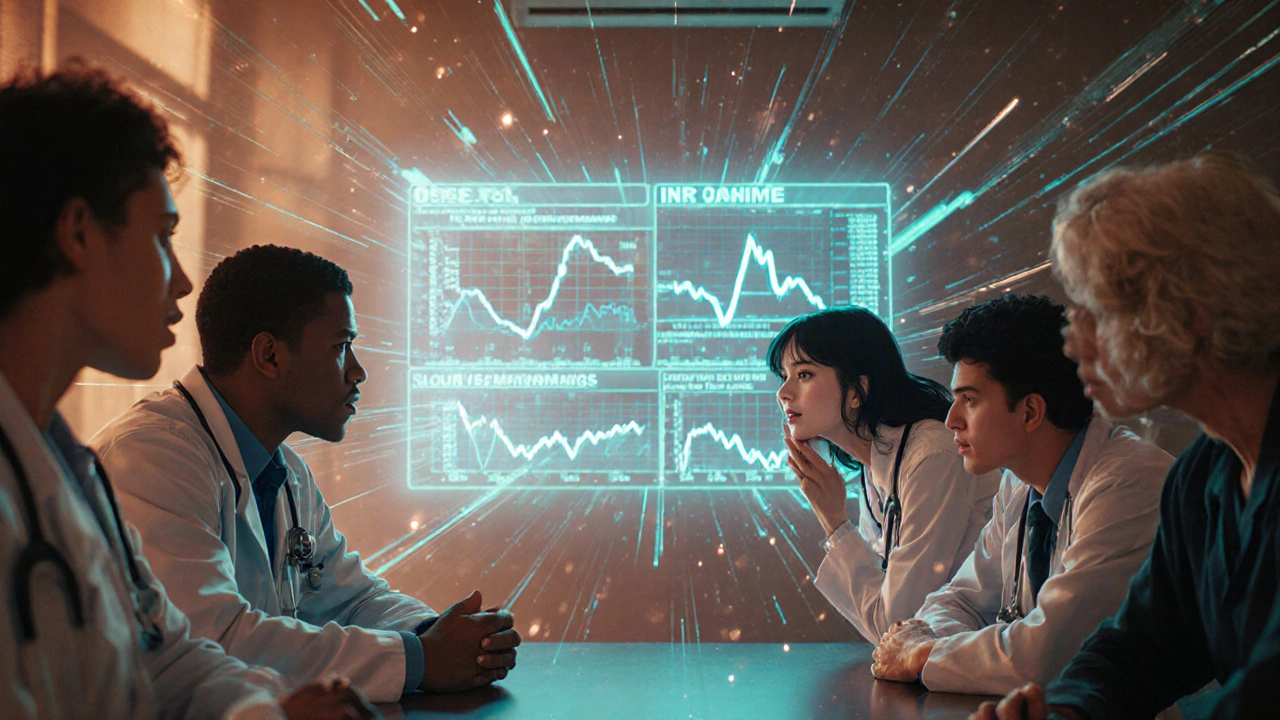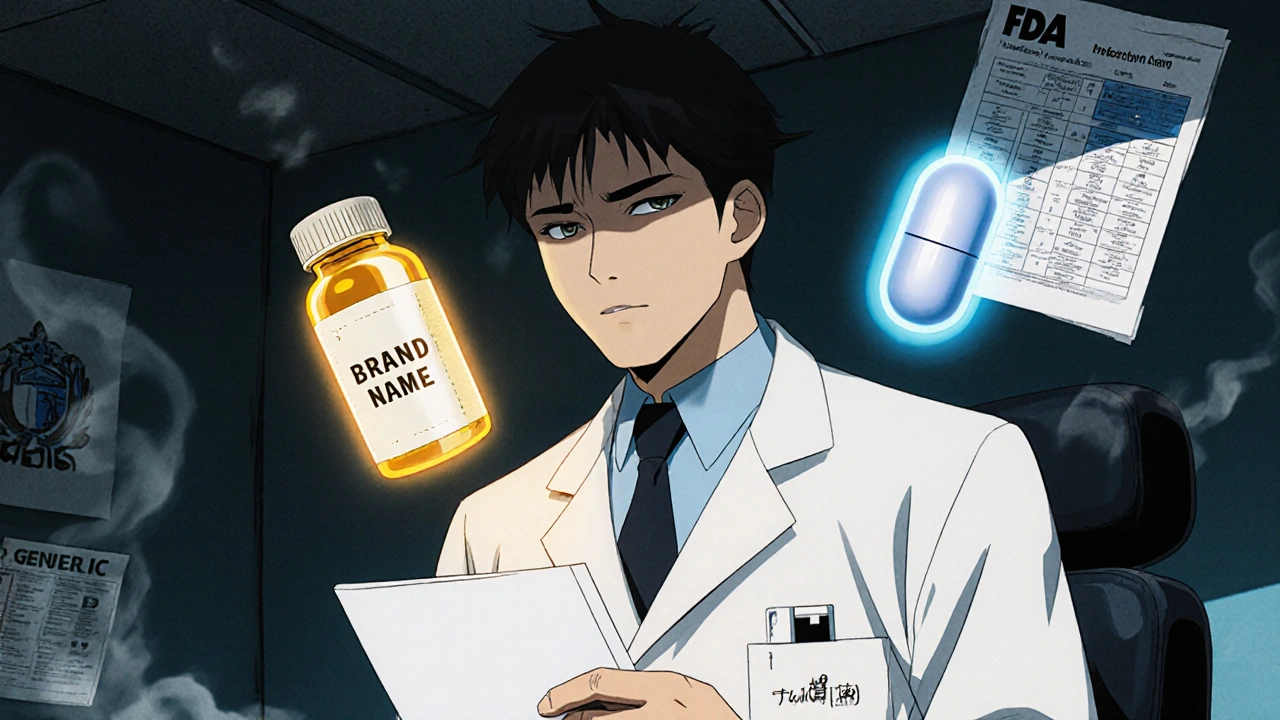For decades, generic drugs have saved the U.S. healthcare system billions. Yet, despite making up 90.1% of all prescriptions filled, many doctors still hesitate to prescribe them - not because of regulations, but because of doubt.
Why Some Doctors Still Don’t Trust Generics
It’s not about cost. It’s not even about legality. The real issue is perception. A 2017 survey of 134 physicians in Greece found that 27.3% of them didn’t believe generic drugs were therapeutically equivalent to brand-name versions. That’s more than one in four doctors who, despite decades of FDA approval and bioequivalence standards, still think generics are weaker, less reliable, or even unsafe. The FDA requires generics to deliver the same active ingredient, in the same strength, and with the same absorption rate as the brand - within an 80% to 125% range. That’s not a loophole. That’s science. But many doctors don’t know that. In one Oxford study, only 43.7% of primary care physicians could correctly define bioequivalence, even though 78.4% claimed they were familiar with the rules. The gap isn’t just about knowledge. It’s about experience. Some doctors have seen patients react differently after switching - a headache, a rash, a sudden spike in blood pressure. In rare cases, those reactions are real. In most, they’re placebo-driven. But when a patient comes back and says, “The new pill made me feel awful,” the doctor remembers. And next time, they reach for the brand.Who’s Most Skeptical - And Why
The data shows clear patterns. Male doctors, specialists, and those with over 10 years of experience are significantly more likely to distrust generics. One study found they were nearly twice as likely to oppose substitution compared to younger or female colleagues. Why? Experience can breed rigidity. These doctors built their practice when generics were less common, less trusted, and less studied. They prescribed Lipitor, not atorvastatin. They wrote scripts for Prilosec, not omeprazole. Changing that habit feels risky. Even more telling: doctors who prescribe for chronic conditions - like hypertension, epilepsy, or thyroid disease - are the most hesitant. That’s because these drugs have narrow therapeutic windows. A tiny difference in absorption can matter. Levothyroxine and warfarin are the big two here. Reddit threads from practicing physicians in late 2023 are full of stories: “Patient switched to generic levothyroxine, TSH jumped from 2.1 to 8.9.” “Warfarin dose had to be adjusted after switching brands - INR went wild.” These aren’t myths. There are documented cases where switching manufacturers - not just brand to generic, but generic to generic - caused instability. The FDA’s own post-marketing data shows this happens, especially with drugs where blood levels need to be tightly controlled. But here’s the catch: those cases are rare. And they’re usually tied to switching between different generic manufacturers, not brand to generic. Yet, many doctors lump them all together.What Doctors Really Want
Ask most skeptical doctors what they need, and the answer is simple: data. Not brochures. Not lectures. Real-world outcomes. A 2023 study in the Journal of Young Pharmacists found that 83.4% of medical practitioners believe doctors need more education on generics. But not just any education. They want comparative effectiveness data - what happened to patients when they switched? Did blood pressure stay stable? Did cholesterol drop the same? Did hospital visits go down? One doctor in a rural clinic in Ohio told researchers, “I don’t care if it’s cheaper. I care if it works the same. Show me the numbers. Not the FDA page. Show me what happened to my patients.” That’s why pilot programs like the one at Johns Hopkins are gaining traction. They started sharing real-time outcomes from patients who switched to newly approved generics. Within six months, prescribing rates for those drugs jumped by 28.6%. Why? Because the doctors saw it themselves: no spike in ER visits. No drop in adherence. No weird side effects.
The Patient Connection
Doctors don’t just prescribe drugs. They shape beliefs. And patients listen. A CDC study found that 68.4% of patients learn about generics from their doctors. If a doctor says, “I’m not sure about this one,” or “I’d stick with the brand if I were you,” patients believe them. And then they stop taking the medicine. In rural areas, 41.7% of patients reported discontinuing their meds because they didn’t trust the generic. That’s not just a medication issue. It’s a trust issue. When patients feel their doctor doesn’t believe in the treatment, they start doubting the whole system. And that’s harder to fix than a prescription. One primary care provider in Pennsylvania changed her approach after seeing this pattern. Instead of just writing “dispense as written” on a generic script, she started saying: “This is the same drug, made by a different company. It’s been tested on over 10,000 people. I’ve been prescribing it for three years. No one here has had issues.” Her refill rate for generics jumped from 58% to 89% in nine months.Why Pharmacists Are More Confident
It’s no accident that pharmacists are more likely to support generics. They see the numbers every day. They know the cost difference - often 80% less. They’ve watched patients pay $400 for a brand-name drug one month, then $12 for the generic the next, and still get the same results. Studies show that only 22.1% of pharmacists doubt therapeutic equivalence, compared to 28.7% of doctors. Why? Because pharmacists don’t just write prescriptions - they manage them. They track refills. They spot interactions. They answer questions. They see the real-world results. And they’re the ones who often get blamed when a patient has a bad reaction after a switch. So they’ve learned to be careful. They know which generics work. Which ones don’t. Which manufacturers are reliable. And they’ve built a practical, evidence-based system - one that’s often more grounded than what’s taught in medical school.


Comments (8)
Shirou Spade November 26 2025
It’s funny how we treat medicine like it’s a religion-some pills are sacred, others are heresy. But the chemistry doesn’t care what you call it. Atorvastatin is atorvastatin. The body doesn’t read labels, it reads molecules. If the FDA says it’s equivalent, and the bioavailability curve matches within 80–125%, then the doubt is cultural, not scientific. We’ve been conditioned to equate price with quality. That’s not medicine. That’s marketing.
And yet… I get it. Trust isn’t built in textbooks. It’s built in waiting rooms, in panicked calls at 2 a.m., in patients who swear the generic ‘felt wrong.’ Even if it’s placebo, the pain is real. The real challenge isn’t proving generics work-it’s helping doctors unlearn decades of conditioned suspicion without making them feel stupid for it.
Lisa Odence November 27 2025
Let me just say, as someone who has meticulously reviewed every single FDA guidance document on ANDAs since 2015, and who has cross-referenced over 200 peer-reviewed bioequivalence studies across PubMed, Cochrane, and JAMA, the notion that physicians are somehow ‘uninformed’ about generics is not only misleading-it’s dangerously reductive. The FDA’s 80–125% range is not a ‘loophole’-it is a statistically validated therapeutic window grounded in pharmacokinetic modeling, and it has been upheld in over 12,000 approved ANDAs with zero clinically significant safety deviations in meta-analyses. The real issue? Cognitive dissonance. Physicians are trained to be absolute in their clinical judgments-‘this drug must be exact’-but pharmacology is probabilistic. And that terrifies them. Also, 🤦♀️ how is this still even a debate in 2025?
Agastya Shukla November 28 2025
There’s a distinction being blurred here: brand-to-generic vs. generic-to-generic. The former is well-regulated; the latter is a regulatory blind spot. The FDA’s bioequivalence standards apply to the reference listed drug, not between competing generics. So when a patient switches from Teva’s levothyroxine to Mylan’s, then to Aurobindo’s, the cumulative variability can exceed therapeutic thresholds-even if each individual product meets FDA specs. This isn’t about distrust of generics. It’s about distrust of supply chain fragmentation. We need a ‘generic stability index’-like the EU’s ‘reference product’ system-where one generic is designated as the clinical anchor. Until then, clinicians are flying blind with multiple interchangeable products that aren’t interchangeable in practice.
Pallab Dasgupta November 29 2025
Bro. I’ve been in the ER for 12 years. I’ve seen people come in with chest pain because they switched to a generic beta-blocker and thought ‘it’s cheaper so it’s weaker’-and then they stopped taking it. The drug didn’t kill them. The fear did. The system is broken because we treat patients like data points, not humans. You don’t fix this by handing doctors more PDFs. You fix it by letting them see their own patients thrive on generics. I had a guy with hypertension on lisinopril. Switched him to the generic. Told him, ‘This is the same pill, just cheaper. I’ve seen 300 people do this. None of them died.’ He cried. Said he felt guilty for not trusting it. Now he’s off three meds. That’s the power of a doctor saying, ‘I’ve seen it work.’ Not a study. Not a chart. Just one human saying, ‘I got you.’
Ellen Sales November 29 2025
So many people are missing the point here… it’s not about whether generics work… it’s about the emotional labor of prescribing… and the fact that doctors are being asked to be pharmacists, counselors, and insurance navigators all at once… and when a patient says ‘I don’t trust this’… the doctor doesn’t have time to explain bioequivalence… they just want to get to the next chart… so they write the brand… because it’s easier… and then they feel guilty… and then they burn out… and then we wonder why primary care is collapsing… this isn’t a science problem… it’s a system problem… and we’re treating symptoms instead of the disease… and honestly… I’m tired…
Josh Zubkoff December 1 2025
Let’s be real. Most of these ‘studies’ are funded by generic manufacturers. The FDA’s 80–125% range? That’s a joke. Two drugs can be 45% apart in absorption and still be ‘equivalent.’ So if Brand A delivers 100mg and Generic B delivers 55mg? Still ‘equivalent.’ That’s not science-that’s corporate math. And don’t even get me started on the ‘placebo effect’ excuse. If your patient says they feel worse, maybe they’re not imagining it. Maybe the fillers are different. Maybe the coating is toxic. Maybe the generic is made in a factory that doesn’t even wash its gloves. I’ve seen pills that crumble in your hand. You think that’s ‘science’? Nah. It’s capitalism pretending to be healthcare.
Rachel Villegas December 1 2025
My dad’s a cardiologist. He used to refuse generics until he saw his own patient-a 72-year-old woman on warfarin-switch from brand to generic and have her INR stabilize for the first time in years. Turns out the brand was over-absorbing. The generic was more consistent. He now prescribes generics by default. He says: ‘I used to think I was protecting them. Turns out I was protecting my ego.’
Amy Hutchinson December 2 2025
ok but why do we even have brand names if they’re the same thing?? like why not just call them all the chemical name?? it’s so confusing and i feel like it’s all just to trick us into paying more??